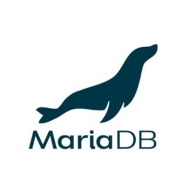

Firebird SQL and MariaDB compete as database management systems. MariaDB often has the upper hand thanks to its comprehensive feature set, performance, and scalability.
Features: Firebird SQL is appreciated for its advanced architecture, efficient resource utilization, and effective deployment across platforms like Linux and Windows. MariaDB stands out with its multiple storage engines, real-time analytics capabilities, and high performance for large-scale applications.
Room for Improvement: Firebird could improve in ease of setup and handling very large datasets. Better integration and optimization tools would enhance its usability further. MariaDB users may seek enhancements in performance for complex queries, better concurrency handling, and more resource-efficient operations.
Ease of Deployment and Customer Service: MariaDB's straightforward setup and strong community support make it user-friendly and accessible, reducing deployment time and complexity. Firebird's deployment requires specialized knowledge, which can be a hurdle, but it benefits from dedicated support channels providing in-depth assistance.
Pricing and ROI: Firebird is known for its low initial costs and attractive long-term ROI, ideal for budget-sensitive projects. MariaDB, while often implying higher initial costs due to its advanced capabilities, offers significant ROI benefits with superior scalability and performance, positioning it as a valuable investment for large enterprises.
| Product | Market Share (%) |
|---|---|
| Firebird SQL | 12.5% |
| MariaDB | 6.2% |
| Other | 81.3% |
| Company Size | Count |
|---|---|
| Small Business | 11 |
| Midsize Enterprise | 3 |
| Company Size | Count |
|---|---|
| Small Business | 27 |
| Midsize Enterprise | 12 |
| Large Enterprise | 26 |
Firebird SQL is an open-source, cross-platform relational database management system that offers an enterprise-level database solution. The solution is designed to be highly secure, efficient, and compatible with various platforms and programming languages. Firebird can operate in both embedded and server modes.
Firebird is an open-source project with an active community of developers and users. It is released under the Initial Developer's Public License (IDPL) and the InterBase Public License, allowing for free use, modification, and distribution.
The Firebird solution requires minimal configuration and its architecture allows it to efficiently handle databases ranging from a few KB to multiple terabytes. It is available for various operating systems, including Windows, Linux, macOS, and several Unix-like platforms.
What are the key features of Firebird SQL?
As part of being a commonly used open-sourced solution, Firebird boasts a vibrant community of developers and users. The community provides extensive documentation, third-party tools, and active forums for support. Businesses can also opt for professional support services offered by third-party vendors for added assurance.
To summarize, Firebird SQL is a robust, scalable, and cost-effective database solution suitable for a wide range of applications and business sizes. Its comprehensive SQL support, security features, and cross-platform compatibility, combined with the active community support, make it a compelling choice for businesses looking to leverage the power of open-source software without compromising on performance or security.
MariaDB is an open source relational database created by the original founders of MySQL. It is considered one of the most popular and trusted database servers throughout the world. MariaDB is a valued component found in most cloud offerings and is the default in many Linux tools. It is also widely used by Wikipedia, WordPress, and Google, among other well-known sites. Maria DB easily melds data into concise information from a vast array of applications, such as banking, online shopping, websites, and more.
MariaDB was originally created to improve MySQL performance. It is the most widely chosen database server due to the solution being super fast, robust, user-friendly, and easily scalable. MariaDB also offers a substantial ecosystem of plugins, storage engines, and numerous other valuable tools that make it very attractive for a significant offering of use cases.
The solution’s newest functionalities include compatibility with Oracle Database and Temporal Data Tables, and advanced clustering with Galera Cluster 4, which make it easier for users to research data history from any point in the past. Additionally, the most recent versions include JSON and GIS features. MariaDB is committed to staying an open source solution.
MariaDB Features
Reviews from Real Users
Faustine C., Engineering Supervisor- Corporate Data Solutions and Services at TZ Telecoms Corporation, shares, “The software provides a lot of information on what is happening inside the database. For most performance parameters it is easy to know if something is not right in the configuration or optimization which helps engineers take remedial fine-tuning measures. For example, if the database is underperforming it is easy to know which performance parameter can be adjusted to handle the workload. It is difficult to troubleshoot database issues if many performance parameters can not be monitored or debugged which is the case with some database management systems. It provides great monitoring of data storage, processing, and performance stability which is really important for real-time data storage and processing. It's a user-friendly product.”
A PeerSpot user who is a Senior Engineer at a tech services company relates, “ The solution's high availability is its most valuable aspect. We have found the product to be stable and the initial setup is pretty simple. I'd rate the solution at a ten out of ten. I'm very happy with it overall. I would recommend the solution to others. It's easy to find details about the product online and to learn about it.”
We monitor all Open Source Databases reviews to prevent fraudulent reviews and keep review quality high. We do not post reviews by company employees or direct competitors. We validate each review for authenticity via cross-reference with LinkedIn, and personal follow-up with the reviewer when necessary.